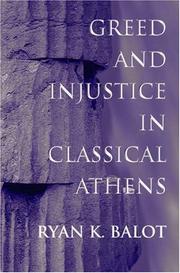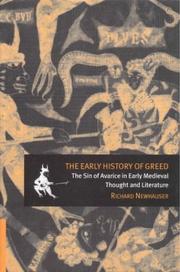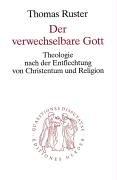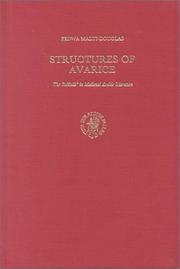| Listing 1 - 10 of 11 | << page >> |
Sort by
|
Book
ISBN: 3030700879 3030700860 Year: 2021 Publisher: Cham, Switzerland : Springer,
Abstract | Keywords | Export | Availability | Bookmark
 Loading...
Loading...Choose an application
- Reference Manager
- EndNote
- RefWorks (Direct export to RefWorks)
Avarice. --- Covetousness --- Greed --- Deadly sins --- Wealth --- Acquisitiveness --- Moral and ethical aspects
Book
ISBN: 3506790064 9783506790064 Year: 1988 Volume: 6 Publisher: Paderborn Schöningh
Abstract | Keywords | Export | Availability | Bookmark
 Loading...
Loading...Choose an application
- Reference Manager
- EndNote
- RefWorks (Direct export to RefWorks)
276 =75 GREGORIUS NAZIANZENUS --- Avarice --- -Covetousness --- Greed --- Deadly sins --- Wealth --- Acquisitiveness --- Griekse patrologie--GREGORIUS NAZIANZENUS --- History --- Moral and ethical aspects --- Gregory of Nazianzus, Saint --- Gregory, --- -Griekse patrologie--GREGORIUS NAZIANZENUS --- Covetousness --- Avarice - History --- Gregory, - of Nazianzus, Saint. - Adversus opum amantes
Book
ISBN: 1299316956 1589836197 9781589836198 9781589836181 1589836189 9781299316959 Year: 2012 Publisher: Atlanta Society of Biblical Literature
Abstract | Keywords | Export | Availability | Bookmark
 Loading...
Loading...Choose an application
- Reference Manager
- EndNote
- RefWorks (Direct export to RefWorks)
Ten commandments --- Bible. --- Commandments, Ten --- Decalogue --- Covetousness --- 296*332 --- 296*332 Philo van Alexandrië:--studies --- Philo van Alexandrië:--studies
Book
ISBN: 1282496972 9786612496974 0742565785 9780742565784 9781282496972 9780742560703 0742560708 9780742560710 0742560716 6612496975 Year: 2009 Publisher: Lanham, Md. Rowman & Littlefield Publishers
Abstract | Keywords | Export | Availability | Bookmark
 Loading...
Loading...Choose an application
- Reference Manager
- EndNote
- RefWorks (Direct export to RefWorks)
24.95
White collar crimes --- Avarice. --- Anomy. --- Anomie --- Durkheimian school of sociology --- Government, Resistance to --- Social psychology --- Sociology --- State, The --- Covetousness --- Greed --- Deadly sins --- Wealth --- Acquisitiveness --- Moral and ethical aspects

ISBN: 069104855X Year: 2001 Publisher: Princeton (N.J.): Princeton university press
Abstract | Keywords | Export | Availability | Bookmark
 Loading...
Loading...Choose an application
- Reference Manager
- EndNote
- RefWorks (Direct export to RefWorks)
Avarice --- -Distributive justice --- -Philosophy, Ancient --- Ancient philosophy --- Greek philosophy --- Philosophy, Greek --- Philosophy, Roman --- Roman philosophy --- Distribution (Economic theory) --- Justice --- Social justice --- Wealth --- Covetousness --- Greed --- Deadly sins --- Acquisitiveness --- History --- Moral and ethical aspects --- Athens (Greece) --- -Politics and government --- Distributive justice --- Philosophy, Ancient. --- History. --- Politics and government. --- Philosophy, Ancient

ISBN: 0521385229 0521026482 1107111676 0511010001 0511115997 0511150903 0511324766 0511485999 1280151706 0511052480 9780511010002 0511037260 9780511037269 9780511115998 9780511485992 9780511052484 9781280151705 9780521385220 9781107111677 9780511150906 9780511324765 Year: 2000 Publisher: Cambridge, U.K. New York Cambridge University Press
Abstract | Keywords | Export | Availability | Bookmark
 Loading...
Loading...Choose an application
- Reference Manager
- EndNote
- RefWorks (Direct export to RefWorks)
The history of avarice as the deadliest vice in western Europe has been said to begin in earnest only with the rise of capitalism or, earlier, the rise of a money economy. In this first full-length study of the early history of greed, Richard Newhauser shows that avaritia, the sin of greed for possessions, has a much longer history, and is more important for an understanding of the Middle Ages, than has previously been allowed. His examination of theological and literary texts composed between the first century CE and the tenth century reveals new significance in the portrayal of various kinds of greed, to the extent that by the early Middle Ages avarice was available to head the list of vices for authors engaged in the task of converting others from pagan materialism to Christian spirituality.
Avarice --- Christian ethics --- History. --- History --- 241.5*3 --- -Christian ethics --- -241.5*3 Ondeugd --- Ondeugd --- Ethical theology --- Moral theology --- Theology, Ethical --- Theology, Moral --- Christian life --- Christian philosophy --- Religious ethics --- Covetousness --- Greed --- Deadly sins --- Wealth --- Acquisitiveness --- -Moral and ethical aspects --- -Avarice --- Morale chrétienne --- Histoire --- -Ethical theology --- 241.5*3 Ondeugd --- Middle Ages, 600-1500 --- Moral and ethical aspects --- Arts and Humanities --- Literature

ISBN: 9780262611978 026211268X 9780262112680 026261197X 9786612099939 0262276763 1282099930 0585448469 9780262276764 9780585448466 9781282099937 Year: 2002 Publisher: Cambridge, MA : MIT Press,
Abstract | Keywords | Export | Availability | Bookmark
 Loading...
Loading...Choose an application
- Reference Manager
- EndNote
- RefWorks (Direct export to RefWorks)
A study of how materialism and consumerism undermine our quality of life.
Acquisitiveness --- Avarice --- Conduct of life --- Happiness --- Materialism --- -#PBIB:2002.4 --- Physicalism --- Animism --- Philosophy --- Positivism --- Dualism --- Idealism --- Mechanism (Philosophy) --- Monism --- Realism --- Gladness --- Emotions --- Cheerfulness --- Contentment --- Pleasure --- Well-being --- Ethics, Practical --- Morals --- Personal conduct --- Ethics --- Philosophical counseling --- Covetousness --- Greed --- Deadly sins --- Wealth --- Acquisitive desire --- Grasping (Psychology) --- Personality --- Compulsive shopping --- Psychological aspects --- Moral and ethical aspects --- Materialisme --- Welzijn --- Materialisme. --- Welzijn. --- #PBIB:2002.4 --- Acquisitiveness. --- Avarice. --- Happiness. --- Conduct of life. --- Psychological aspects. --- COGNITIVE SCIENCES/Psychology/Cognitive Psychology --- ECONOMICS/General
Book
ISBN: 1107236533 1107357667 1139207040 1107341795 1107348048 1107345545 110702627X 1107678943 9781107341791 9781107348042 9781139207041 9781107345546 9781107026278 9781107678941 9781107236530 9781107357662 Year: 2013 Publisher: Cambridge Cambridge University Press
Abstract | Keywords | Export | Availability | Bookmark
 Loading...
Loading...Choose an application
- Reference Manager
- EndNote
- RefWorks (Direct export to RefWorks)
Why are people loyal? How do groups form and how do they create incentives for their members to abide by group norms? Until now, economics has only been able to partially answer these questions. In this groundbreaking work, Paul Frijters presents a new unified theory of human behaviour. To do so, he incorporates comprehensive yet tractable definitions of love and power, and the dynamics of groups and networks, into the traditional mainstream economic view. The result is an enhanced view of human societies that nevertheless retains the pursuit of self-interest at its core. This book provides a digestible but comprehensive theory of our socioeconomic system, which condenses its immense complexity into simplified representations. The result both illuminates humanity's history and suggests ways forward for policies today, in areas as diverse as poverty reduction and tax compliance.
Avarice. --- Economic man. --- Reciprocity (Commerce) --- Social groups. --- Social networks. --- Networking, Social --- Networks, Social --- Social networking --- Social support systems --- Support systems, Social --- Interpersonal relations --- Cliques (Sociology) --- Microblogs --- Association --- Group dynamics --- Groups, Social --- Associations, institutions, etc. --- Social participation --- Fair trade (Tariff) --- Reciprocity --- Commercial policy --- Commercial treaties --- Favored nation clause --- Tariff --- Homo oeconomicus --- Human beings --- Economics --- Self-interest --- Covetousness --- Greed --- Deadly sins --- Wealth --- Acquisitiveness --- Moral and ethical aspects --- Business, Economy and Management

ISBN: 3451021811 9783451021817 Year: 2001 Volume: 181 Publisher: Freiburg Herder
Abstract | Keywords | Export | Availability | Bookmark
 Loading...
Loading...Choose an application
- Reference Manager
- EndNote
- RefWorks (Direct export to RefWorks)
Doctrine of God (christianism) --- Avarice --- Idolatry --- -Idolatry --- -231 --- Covetousness --- Greed --- Acquisitiveness --- -Capitalism --- -Economics --- Wealth --- Affluence --- Distribution of wealth --- Fortunes --- Riches --- Economic theory --- Political economy --- Market economy --- 231 God. De Deo uno et trino:--dogmatisch --- God. De Deo uno et trino:--dogmatisch --- Religious aspects --- -Christianity --- Capitalism --- Economics --- God (Christianity) --- 231 --- Idols and images --- Business --- Finance --- Capital --- Money --- Property --- Well-being --- Christianity --- Trinity --- Social sciences --- Economic man --- Profit --- Deadly sins --- Religious aspects&delete& --- Worship --- Moral and ethical aspects --- Christianity and economics --- Wealth - Religious aspects - Christianity --- Avarice - Religious aspects - Christianity --- Capitalism - Religious aspects - Christianity --- Economics - Religious aspects - Christianity

ISBN: 9004074856 Year: 1985 Volume: 11 Publisher: Leiden Brill
Abstract | Keywords | Export | Availability | Bookmark
 Loading...
Loading...Choose an application
- Reference Manager
- EndNote
- RefWorks (Direct export to RefWorks)
Arabic literature --- -Avarice --- Avarice in literature --- Civilization, Medieval, in literature --- Covetousness --- Greed --- Deadly sins --- Wealth --- Acquisitiveness --- Middle Eastern literature --- North African literature --- History and criticism --- Moral and ethical aspects --- Jahiz --- -Khatib al-Baghdadi, Abu Bakr Ahmad ibn 'Ali --- Religion and ethics --- Avarice --- Jāḥiẓ, --- Khaṭīb al-Baghdādī, Abū Bakr Aḥmad ibn ʻAlī, --- Baghdādī, Abū Bakr Aḥmad ibn ʻAlī Khaṭīb, --- الخطيب البغدادي، أبو بكر، --- الخطيب، أبو بكر أحمد بن علي بن ثابت --- خاطيب البغدادي، أبو بكر نن علي --- ختيب ال بغدادي، ابو بكر اهمد بن علي، --- خطيب البغدادي، أبو بكر أحمد بن على --- خطيب البغدادي، أبو بكر أحمد بن علي، --- خطيب البغدادي، أبو بكر بن علي --- خطيب البغدادي، أبو بکر أحمد بن علي --- خطيب البغدادي، أبو بکر أحمد بن علي، --- خطيب البغدادي، أبوبكر أحمد بن علي --- خطيب البغدادي، أبي بكر أحمد بن علي --- خطيب البغدادي، ٠ أبو بكر أحمد ابن علي،
| Listing 1 - 10 of 11 | << page >> |
Sort by
|

 Search
Search Feedback
Feedback About UniCat
About UniCat  Help
Help News
News